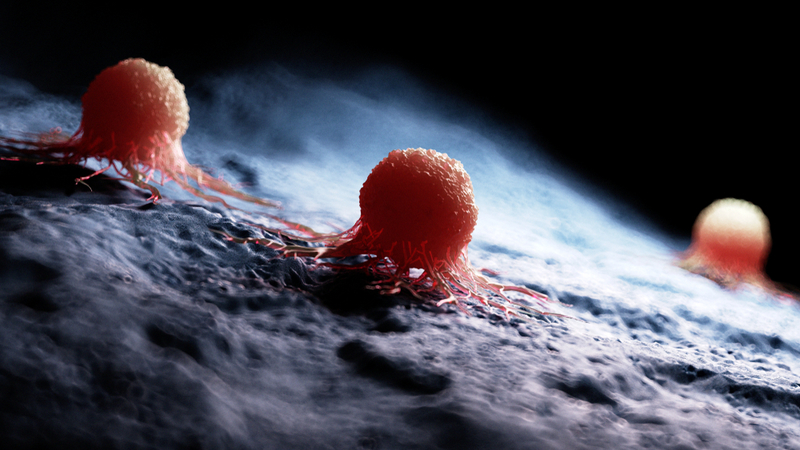Next-generation LOXO-195, shows promise against tumours with acquired resistance to first-generation therapeutics
AACR Annual Meeting 2019 Newsroom Apr 04, 2019
The investigational anticancer therapeutic LOXO-195 (now known as BAY 2731954), which targets a family of proteins called TRKs, was safe, tolerable, and showed signs of clinical activity in patients who had solid tumors that harbored NTRK gene fusions and had become resistant to other TRK-targeted therapeutics, according to results from patients enrolled in a phase I clinical trial and a U.S. Food and Drug Administration (FDA) expanded access program, which were presented at the AACR Annual Meeting 2019, March 29–April 3.

“NTRK gene fusions, which cause heightened activity of TRK proteins, are detected in a wide range of cancer types,” said David Hyman, MD, chief of the Early Drug Development Service at Memorial Sloan Kettering Cancer Center in New York. “Although these genetically defined cancers are rare, accounting for about 0.5 percent of all cancer cases diagnosed in the United States, a high percentage of patients respond to treatment with TRK inhibitors, including larotrectinib [Vitrakvi], which was approved by the FDA in November 2018.
“Unfortunately, most tumors that initially respond eventually become resistant to first-generation TRK inhibitors like larotrectinib,” continued Hyman. “This is frequently because the tumor has acquired mutations in NTRK that reduce the ability of the therapeutic to block TRK activity.”
Hyman explained that LOXO-195 is a next-generation TRK inhibitor designed to be able to block TRK activity even if a tumor has acquired NTRK resistance mutations.
“Our preliminary data show that LOXO-195 can cause responses in patients whose NTRK fusion–positive cancers had acquired NTRK resistance mutations during treatment with a prior TRK inhibitor,” said Hyman. “These data suggest that LOXO-195 could eventually be a meaningful treatment for patients whose cancers are resistant to first-generation TRK inhibitors.”
As of Dec. 3, 2018, there were 20 patients who had received LOXO-195 through the phase I clinical trial and 11 patients who had received the second-generation TRK-targeted therapeutic through an FDA expanded access single patient protocol. All the patients, who included seven children and 24 adults, had previously been treated with at least one first-generation TRK-targeted therapeutic.
As of Dec. 3, 2018, 29 of the patients were evaluable for response. Ten of the patients (34 percent) had a confirmed complete or partial response, as assessed by RECIST 1.1 criteria.
When the researchers analyzed the data based on the mechanisms underlying resistance to the first-generation TRK inhibitors, they found that nine of 20 patients (45 percent) whose tumors were determined to have become resistant by acquiring an NTRK gene mutation had a complete or partial response. None of the three patients whose tumors were determined to have become resistant by TRK-independent mechanisms responded to LOXO-195.
“We were pleased to see that the response data were consistent with what we expected based on our biological understanding of the mechanisms of resistance identified in these patients,” said Hyman. “We saw responses in patients whose tumors had acquired mutations that led the tumors to maintain dependence on TRK for growth and survival and no responses in patients whose tumors had acquired mutations that led the tumors to become independent of TRK.
“Given how promising our early data are, I would encourage patients who have disease progression after treatment with a first-generation TRK inhibitor to seek out a clinical trial testing a next-generation TRK-inhibitor,” added Hyman.
In the phase I clinical trial, a range of doses of LOXO-195, from 32 mg daily to 150 mg twice daily, were tested. Observed toxicities were consistent with the anticipated side effects of TRK inhibition, according to Hyman. The most common adverse events, regardless of investigator attribution, were dizziness/ataxia, nausea/vomiting, anemia, myalgia, abdominal pain, fatigue, and lymphopenia. Dose selection is ongoing in both children and adults.
According to Hyman, the main limitations of the study are the small number of patients treated to date and the fact that some patients were treated through an FDA expanded access single patient protocol, which means that the completeness of data collection for these patients was less than for the patients enrolled in the clinical trial.
This study was funded by Loxo Oncology and Bayer. Hyman has received compensation from Bayer for consultancy work and research funding from Loxo Oncology and Bayer.
This article is a press release from The American Association for Cancer Research (AACR) Annual Meeting 2019. Read the original here.
-
Exclusive Write-ups & Webinars by KOLs
-
Daily Quiz by specialty
-
Paid Market Research Surveys
-
Case discussions, News & Journals' summaries